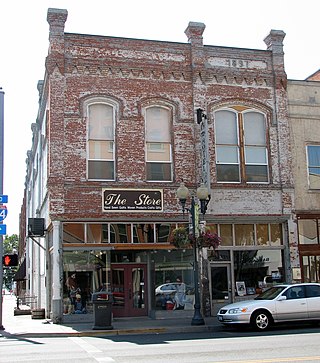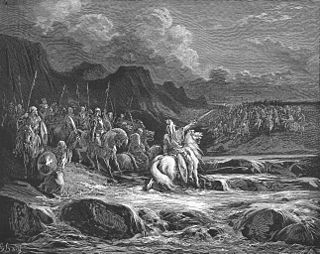
The Maccabees, also spelled Machabees, were a group of Jewish rebel warriors who took control of Judea, which at the time was part of the Seleucid Empire. They founded the Hasmonean dynasty, which ruled from 167 to 37 BCE, being a fully independent kingdom from 104 to 63 BCE. They reasserted the Jewish religion, expanded the boundaries of Judea by conquest, and reduced the influence of Hellenism and Hellenistic Judaism.

Simon Thassi was the second son of Mattathias and thus a member of the Hasmonean family.
1 Maccabees, also known as the First Book of Maccabees, First Maccabees, and abbreviated as 1 Macc., is a deuterocanonical book which details the history of the Maccabean Revolt against the Seleucid Empire as well as the founding and earliest history of the independent Hasmonean kingdom. It describes the promulgation of decrees forbidding traditional Jewish practices by King Antiochus IV Epiphanes and the formation of a rebellion against him by Mattathias of the Hasmonean family and his five sons. Mattathias's son Judas Maccabeus takes over the revolt and the rebels as a group are called the Maccabees; the book chronicles in detail the successes and setbacks of the rebellion. While Judas is eventually killed in battle, the Maccabees eventually achieve autonomy and then independence for Judea under the leadership of the Hasmonean family. Judas's brother Simon Thassi is declared High Priest by will of the Jewish people. The time period described is from around 170 BC to 134 BC.

Judah Maccabee was a Jewish priest (kohen) and a son of the priest Mattathias. He led the Maccabean Revolt against the Seleucid Empire.

Knights of the Maccabees was a fraternal organization formed in 1878 in London, Ontario, Canada. Most active in the U.S. state of Michigan, the group's fraternal aspects took a backseat to providing low-cost insurance to members. In the society's early years it also provided other final-expense related benefits such as society cemeteries.
A Maccabi or Maccabee is one of the Maccabees, a group of Jewish rebel warriors who controlled Judea.

The Battle of Elasa was fought in April 160 BCE during the Maccabean Revolt between Judean rebels led by Judas Maccabeus and an army of the Seleucid Empire under the command of Bacchides. The battle resulted in the triumph of the Greek Syrian forces, the defeat of the Maccabees, and the death of Judas Maccabeus.

The Battle of Emmaus took place around September 165 BC during the Maccabean Revolt between Judean rebels, led by Judas Maccabeus, and an expedition of Seleucid Empire forces under generals Gorgias, Ptolemy the son of Dorymenes, and Nicanor near Emmaus. The battle was won by the Maccabee rebels, who marched by night and surprised the Seleucid camp while many soldiers were absent. The victorious Maccabees looted the Greek camp for valuables and likely weapons to help further their cause.
Alcimus, also called Jakeimos, Jacimus, or Joachim (Ἰάκειμος), was High Priest of Israel for three years from 162–159 BCE. He was a moderate Hellenizer who favored the ruling government of the Seleucid Empire and opposed the Maccabean Revolt which was in progress at the time.
Timothy was a military commander of the Seleucid Empire, active during the mid 2nd century BCE and probabaly a governor in the land of Ammon and Gilead. He fought during the Maccabee campaigns of 163 BC against the local Jews, and eventually the Maccabee rebel army themselves. He was eventually defeated by Judas Maccabeus at Dathema in Gilead.

Mattathias ben Johanan was a Kohen who helped spark the Maccabean Revolt against the Hellenistic Seleucid Empire. Mattathias's story is related in the deuterocanonical book of 1 Maccabees. Mattathias is accorded a central role in the story of Hanukkah and, as a result, is named in the Al HaNissim prayer Jews add to the Birkat Hamazon and the Amidah during the festival's eight days.

The Battle of Beth Horon or Battle with Seron was fought at some point between Spring 166 BC to Spring 165 BC during the Maccabean Revolt between Judean rebels led by Judas Maccabeus and an army of the Seleucid Empire under the command of Seron, a commander of the Syrian army. Beth-Horon, or Bethoron, was a strategic mountain pass leading from the coastal plain to the Judean hill country. Utilizing guerrilla warfare tactics, the Maccabee rebels ambushed the passing Seleucid force from the pass, pursuing the surprised and fleeing remnants into the plain.
The Battle of Adasa was fought during the Maccabean revolt on the 13th of the month Adar, 161 BC at Adasa, near Beth-horon. It was a battle between the rebel Maccabees of Judas Maccabeus and the Seleucid Empire, whose army was led by Nicanor. The Maccabees won the battle after killing Nicanor early in the fighting. The battle came after a period of political maneuvering over several months where the peace deal established a year earlier by Lysias was tested by the new High Priest Alcimus, the new military governor Nicanor, and the Maccabee leader Judas Maccabeus.
Lysias was a 2nd-century BC general and governor of Syria under the Seleucid Empire.
The Hasideans were a Jewish group during the Maccabean Revolt that took place from around 167–142 BCE. The Hasideans are mentioned three times in the books of the Maccabees, the main contemporary sources from the period. According to the book 1 Maccabees, during the early phases of the anti-Jewish decrees and persecution proclaimed by King Antiochus IV Epiphanes, some Hasideans joined up with Mattathias the Hasmonean as he martialed forces and allies for his rebellion. Later on, during the term of High Priest Alcimus, some Hasideans apparently trusted Alcimus's promises at first and attempted to negotiate a settlement with the government, but were betrayed and executed. In the book 2 Maccabees, Judas Maccabeus is described as the leader of the Hasideans and of them all as troublemakers disrupting the peace, but by Alcimus, a source the book considers untrustworthy and corrupt.

Mizpah was a city of the tribe of Benjamin referred to in the Hebrew Bible.

The Battle of the Ascent of Lebonah or Battle with Apollonius was the first battle fought between the Maccabees and the Seleucid Empire in 167 or 166 BCE. The Jewish forces were led by Judas Maccabeus and the Seleucid army force was under the command of Apollonius, described by Josephus as "the strategos (general) of the Samaritan forces".

The Maccabean Revolt was a Jewish rebellion led by the Maccabees against the Seleucid Empire and against Hellenistic influence on Jewish life. The main phase of the revolt lasted from 167 to 160 BCE and ended with the Seleucids in control of Judea, but conflict between the Maccabees, Hellenized Jews, and the Seleucids continued until 134 BCE, with the Maccabees eventually attaining independence.
Jazer was a city east of the Jordan River, in or near Gilead, inhabited by the Amorites. It was taken by a special expedition sent by Moses to conquer it towards the end of the Israelites' Exodus journey from Egypt. From the Septuagint it appears that Jazer was on the border of Ammon. As an important city it gave its name to the whole of the surrounding territory - a "Sea of Jazer" is mentioned in Jeremiah xlviii. 32.

During the Maccabean Revolt against the Seleucid Empire, there were a series of campaigns in 163 BC in regions outlying Judea - Ammon, Gilead, Galilee, Idumea, and Judea's coastal plain, a wider region usually referred to as either Palestine or Eretz Israel. The Maccabee rebels fought multiple enemies: Seleucid garrisons and hired mercenaries under a commander named Timothy of Ammon, non-Jewish inhabitants hostile to the Maccabees and their Jewish neighbors, and possibly the Tobiad Jews, a clan that generally favored the ruling Seleucid government. During 163 BC, the main Seleucid armies composed of Greeks were elsewhere, so the Maccabees were free to expand their influence against their neighbors.











